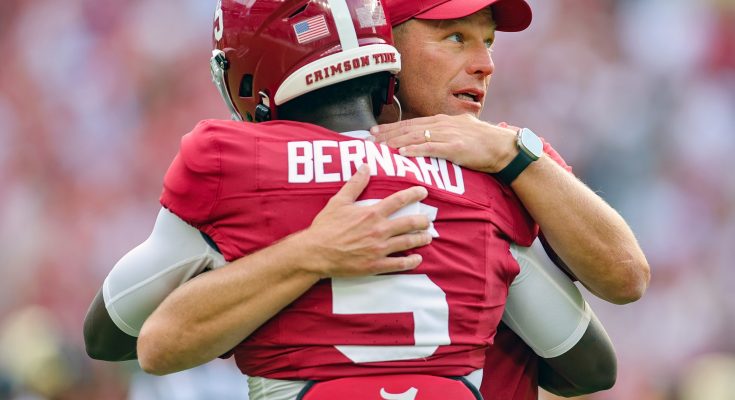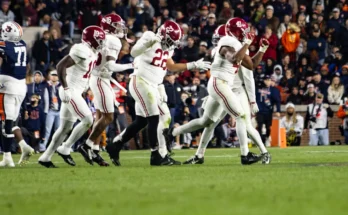“Deontae Lawson Declares Kalen DeBoer the Perfect Leader for Alabama’s Future: A Players’ Coach for the New Era”
When Alabama linebacker and team captain Deontae Lawson stood in front of reporters and said, “Coach DeBoer is a great fit for the new era of college football, basically. He’s just a players coach,” he wasn’t throwing out a cliché. Lawson’s words were grounded in experience, reflection, and the evolving identity of a Crimson Tide program transitioning from the greatest coaching era in modern college football to a bold, player-focused new chapter.
Alabama isn’t just trying to stay afloat in a rapidly shifting landscape. It’s aiming to evolve. And according to Lawson and several veteran leaders inside the program, Kalen DeBoer isn’t merely filling a legendary vacancy—he’s unlocking a cultural shift built on connection, empowerment, and flexibility.
Lawson, who emerged as one of Alabama’s top voices on and off the field, has been through it all—the intense discipline of the Nick Saban era, the heartbreak of high-stakes losses, and the thrill of playing on national stages. So when he endorses DeBoer not just as a fit, but the fit, it carries weight inside and outside the locker room.
DeBoer, hired in January 2024 after Saban’s retirement, came in with a résumé built on winning—going 25–3 in two seasons at Washington, culminating in a national title game appearance. But what set him apart in Tuscaloosa wasn’t the wins alone. It was the way he integrated into a tradition-bound program without trying to copy his legendary predecessor. Instead of replicating the Saban blueprint, DeBoer created his own version of Alabama football—rooted in respect, communication, and an understanding of the modern athlete.
That’s what Lawson means when he says “players coach.” It doesn’t mean lax discipline or light practices. It means DeBoer sees the people in the jerseys—not just the performances.
“He listens,” Lawson continued. “He gets to know you—not just how you play, but where you’re from, what you’re about. That builds trust. That’s what today’s players want. That’s what we need.”
DeBoer’s ability to quickly build trust was put to the test right away. With the transfer portal wide open and NIL conversations swirling, many wondered how Alabama would hold onto its core. Star quarterback Jalen Milroe was among the first to shut down transfer rumors, citing DeBoer’s vision and transparency.
“He came in and made it clear—he’s not Nick Saban, and that’s okay,” Milroe said during spring camp. “He told us, ‘This is a partnership.’ That’s all we needed to hear.”
DeBoer’s first spring with the Tide revealed just how collaborative his approach truly is. He welcomed player input on practice structures, held team-building meetings led by players rather than staff, and even adjusted travel plans to better accommodate players’ academic and recovery needs. Some fans, at first, viewed these shifts as too “soft.” But internally, players saw a coach who respected their time and lives—something Lawson says goes further than any rah-rah speech or hard-nosed drill ever could.
“It’s not about yelling anymore,” Lawson said. “It’s about teaching. It’s about meeting us where we’re at. Coach DeBoer gets that.”
And Lawson would know. Now entering his fourth year in the program, he’s seen the evolution of leadership styles and the growing importance of mental health, NIL pressures, and balancing social expectations. “Being a college football player today is different than it was five years ago,” he said. “We deal with more off the field. And Coach DeBoer makes space for that.”
It’s not just talk. DeBoer has made several hires specifically designed to support holistic player development. He expanded Alabama’s mental health staff, added a director of player branding to help manage NIL opportunities, and introduced new tech-driven recovery systems that individualize workouts and rehab. All of this is part of his belief that elite performance stems from total well-being.
“Coach is big on telling us, ‘You can’t give your all if you’re not all together,’” Lawson said. “He really lives that.”
Still, there’s no confusion about expectations. DeBoer demands discipline, effort, and detail. Practices remain intense. Film sessions are rigorous. But they come wrapped in dialogue and development—not dictatorship.
Senior cornerback Kool-Aid McKinstry praised the new culture, saying, “It’s not like we’re just getting coddled. We’re working. But it feels like we’re in it together. It’s a family vibe again.”
That sense of family was tested in the 2025 offseason, especially as multiple SEC powers ramped up NIL pitches and roster churn became unavoidable. Through it all, Alabama retained most of its leaders and drew in key transfer talent. DeBoer’s message was simple: Come to Alabama to grow—not just to win, but to mature, to lead, and to be prepared for what comes after football.
Lawson has taken that personally. With NFL scouts already projecting him as a top linebacker in the 2026 draft class, he could have opted out of spring or slowed his pace. Instead, he’s taken on a more vocal leadership role under DeBoer’s guidance, mentoring younger linebackers and helping set the defensive tone.
“He told me, ‘This is your team too,’” Lawson said. “I’d never had a coach say it that plainly.”
That empowerment is translating across the roster. Defensive linemen are calling protections out pre-snap. Safeties are making coverage checks. Offensive linemen have input in blocking schemes. The result? Practices that feel more like pro-style prep than college routines.
“You feel like you’re being prepared for the next level,” Lawson added. “But you also feel seen.”
That balance—discipline and empathy, structure and freedom—is what makes DeBoer, in Lawson’s words, “perfect for this new era.”
College football has changed. It’s faster, more flexible, and more complex off the field. Loyalty can’t be demanded; it must be earned. And for players navigating a high-pressure ecosystem, a coach who leads with humility and openness is more valuable than ever.
DeBoer’s ability to guide without ego is something even former Alabama players have noticed. Bryce Young visited spring practice and told current players, “Y’all got something special here. Coach D is real.” Other alums, including Derrick Henry and Will Anderson Jr., have publicly praised the cultural tone in Tuscaloosa.
It helps that DeBoer’s football IQ is off the charts. His offensive acumen has given Alabama’s attack new wrinkles, including spread-heavy sets, option packages for Milroe, and tight end utilization that Saban’s teams rarely explored. But Lawson said it’s not just the schemes—it’s how he installs them.
“Coach breaks it down in ways we understand. He teaches like he respects our minds, not just our bodies.”
That cerebral approach is rubbing off. Lawson says younger players like freshman LB Jaylen Mbakwe and defensive back Zabien Brown are thriving because they’re being treated as equals in the room—not just rookies to mold.
“It’s different when a coach coaches through trust,” Lawson said. “It makes you want to play for him. Not just for the wins, but for him.”
That buy-in may ultimately determine Alabama’s ceiling under DeBoer. The SEC remains a brutal gauntlet, and Georgia, Texas, and LSU aren’t slowing down. But Lawson believes Alabama has the edge in one overlooked area—identity.
“We know who we are,” he said. “We’re not trying to be last year’s team or last decade’s dynasty. We’re today’s team. And Coach DeBoer leads like today.”
It’s still early in the DeBoer era, but if Lawson’s voice echoes throughout the locker room—and it does—then Alabama has not only weathered the departure of a legend. It’s embraced a new beginning grounded in unity, understanding, and modern leadership.
As Lawson summed it up, “Coach is building something real. Not just wins. A program we’re proud of. A team that listens. A family.”
And for Alabama, a family led by a players’ coach might be the key to sustained greatness in this new era of college football.



